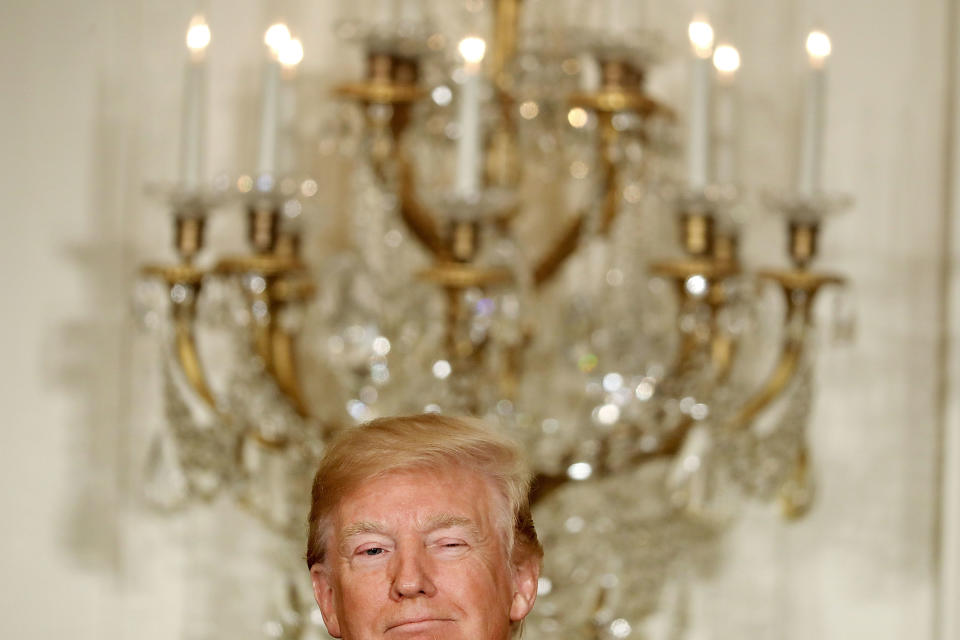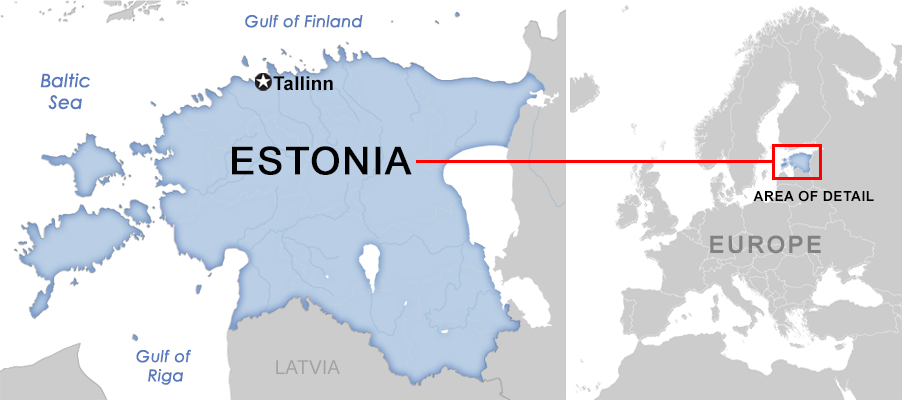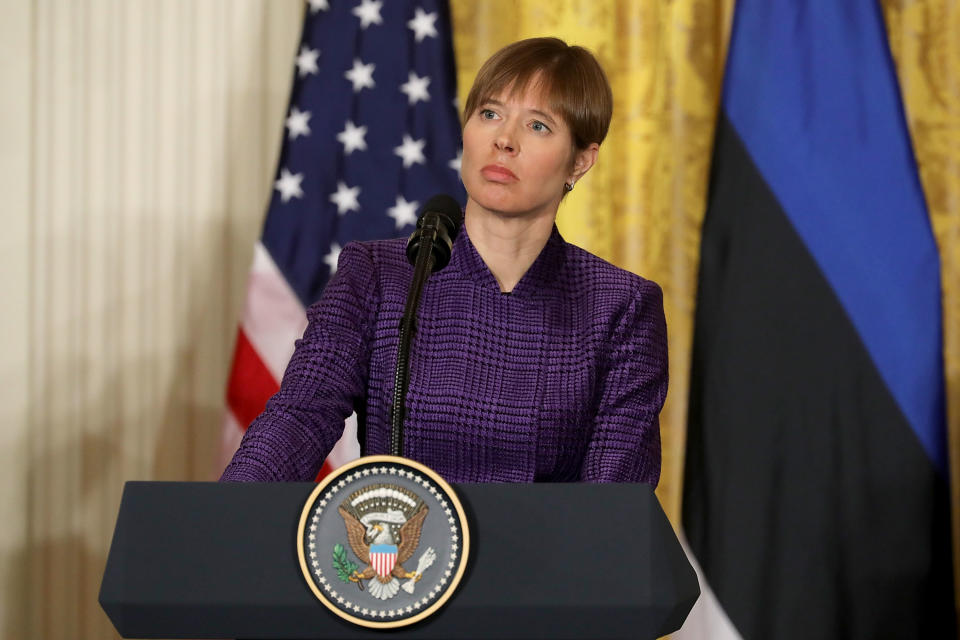Estonia’s president says Trump gets it about Russia
WASHINGTON—As questions swirl around President Trump’s relationship with the Kremlin, the president of Estonia, a country on Russia’s border, dismissed concerns about American foreign policy. In a meeting with reporters Wednesday, a day after meeting with Trump and the leaders of the two other Baltic states, Estonian President Kersti Kaljulaid said Trump’s posture toward the Kremlin has been clear and in line with prior administrations.
The three Baltic nations — Estonia, Latvia and Lithuania — are located just to Russia’s west and are part of the NATO alliance. They were occupied by the Soviet Union after World War II and regained independence as the USSR was dissolved. Due to their history and location, the Baltic nations are uniquely concerned with potential Russian aggression.
Kaljulaid spent much of her conversation with reporters on Wednesday pushing back against the perception that Trump has been unusually soft on Russian President Vladimir Putin and tepid in his commitment to NATO.
“We’ve seen solid foreign policy. As we hoped it could be, it is,” Kaljulaid said of the Trump administration.
Questions about Trump’s foreign policy began when he seemed reluctant to commit to Article 5 of the NATO treaty, which stipulates that an attack on one member of the alliance will be treated as an attack on them all. Trump finally announced his support for Article 5 last June after generating speculation with speeches criticizing other NATO nations for not meeting the alliance’s guideline of contributing 2 percent of their economic output to defense spending.

When asked if she is concerned about Trump’s position on NATO, Kaljulaid cited Trump’s engagement with the Baltic nations as clear evidence he’s committed to supporting Western allies against potential threats from Russia.
“We have seen a foreign policy which looks like it’s value-based, because otherwise why would you pay attention to our region?” Kaljulaid said. “It looks very much sincere in its attempt to involve us in the security debate in Europe. … If this is not value-based foreign policy I don’t know what it is.”
Along with his comments about NATO, concerns about Trump’s stance toward Russia have come from what the president has not said about Putin. Many foreign policy experts view Trump as reluctant to criticize Putin in public, even as Russia increasingly launches digital attacks and even physical assaults in Western countries. But Kaljulaid rejected this view. She pointed to comments Trump made in his appearances with the Baltic leaders on Wednesday, where he touted his toughness toward Putin and cited America’s expulsion of Russian diplomats last month after the Kremlin was accused of orchestrating a chemical attack on an ex-spy in Britain.
“The United States expelled a high number of diplomats and he mentioned this yesterday several times as him being tough with Russia and being tough with Putin … so he has done it,” Kaljulaid said of Trump.
The intrigue surrounding Trump’s posture toward Putin has also been amplified by the U.S. intelligence community’s conclusion that the Kremlin’s intervention in the 2016 presidential election was aimed at aiding Trump. But Kaljulaid told Yahoo News she’s not following the ongoing special counsel investigation into whether Trump’s campaign cooperated with these Russian efforts. She said she would wait until the special counsel issues a report.

Not all foreign leaders seem as certain of Trump as the Estonian president. Kaljulaid’s conversation with the press came less than a month after her foreign minister, Sven Mikser, described Trump as “unorthodox” and unpredictable in his own conversation with American reporters when he was in Washington to meet with former Secretary of State Rex Tillerson. Since then, Tillerson and a number of other top administration officials have left the White House. And on Wednesday, Lithuanian President Dalia Grybauskaite also used the word “unpredictable” to describe Trump in a joint appearance with the American president and the three Baltic leaders.
But Kaljulaid insisted that Trump’s foreign policy has not been a “departure” from that of prior administrations. She said her country always communicates “sincerely and honestly” with American officials in order to “synchronize” their thinking. Kaljulaid also suggested she was heartened by visits to Estonia from Vice President Mike Pence and House Speaker Paul Ryan. She told Yahoo News that Pence and Trump were on the “same page” in their communications.
“If I look at the whole administration, then we have been very happy with the relations we have developed,” Kaljulaid said.
Of course, with Estonia’s position as a smaller country on Russia’s border, Kaljulaid has strong incentive not to criticize the United States, a key NATO ally. However, she suggested the outside world is more concerned about the possibility Russia could send troops across the border than Estonia is.
“This kind of feeling that something might happen was definitely external to our country, not internal,” said Kaljulaid.
Kaljulaid presented an analogy to describe her view of the potential for Russian military aggression in Estonia.
“It’s a little bit like … in Japan, you don’t ask [the] Japanese, ‘Are you terribly afraid of earthquakes?’ They’re prepared for that. They build houses which are resilient,” Kaljulaid said.
Kaljulaid was also clearly heartened by the Trump administration’s decision to expel the Russian diplomats, a move some see as evidence he is adopting a stronger stance toward Putin. She returned to this when a reporter asked her about the notion Trump has offered the Russian president “constant praise.” Kaljulaid acknowledged Trump expressed hope that he could have a good relationship with Putin, but pointed out this was paired with the “concerted action” in response to the chemical attack in Britain.

“What President Trump said was that he doesn’t know President Putin and he doesn’t know whether he would get on with him … or [if] he cannot reason with him. I don’t call this praise in any way,” said Kaljulaid.
Kaljulaid said she was “satisfied” with the expulsion of diplomats as an initial answer to the chemical attack. She also expressed confidence further steps would be taken.
Last month, Trump discussed a possible meeting with Putin in Washington, raising additional questions from foreign-policy observers. Kaljulaid said she didn’t discuss this meeting with Trump, but isn’t alarmed by the possibility.
“I trust the judgment of this administration,” she said.
Overall, Kaljulaid is not necessarily opposed to increased engagement with Russia.
“Our own prime minister was supposed to go and visit Russia … but engagement doesn’t mean that we are not firm,” Kaljulaid explained.
Among the many inquiries Kaljulaid faced from reporters about Trump was the most basic question of them all. Does she “like” the American president? Kaljulaid responded with a decidedly diplomatic dodge.
“My job is to love my colleagues, and like my colleagues, and work with my colleagues,” Kaljulaid said, adding, “That’s simply how you have to see the world if you are in this job. So, I definitely don’t think in those terms. It would be weird.”

Read more from Yahoo News:
Ken Starr: Justice Department should evaluate claims by Stormy Daniels
Photos: Chappaquiddick: A tragedy that changed the course of American history
(Cover Photo credit: Olivier Douliery/AFP/Getty Images)[/caption]

